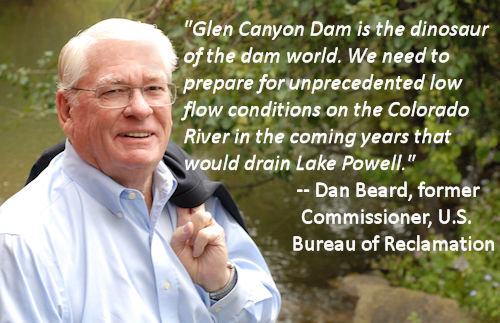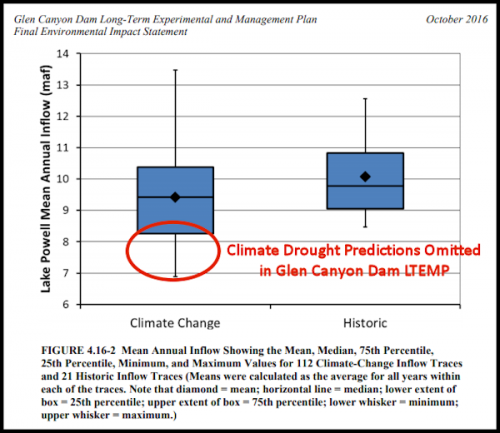In September of 2017, we launched our “Tear Down Glen Canyon Dam” campaign. Several aspects of this campaign are forthcoming including legal, advocacy, and organizing components. Please check out our video, “Top Ten Reasons To Tear Down Glen Canyon Dam”.
Check out the press release about our Glen Canyon Dam lawsuit below.
For Immediate Release
October 1, 2019
Contact: Gary Wockner, Save The Colorado, 970-218-8310
Climate Change Lawsuit Launched Against Glen Canyon Dam
“Glen Canyon Dam is the dinosaur of the dam world. We need to prepare for unprecedented low flow conditions on the Colorado River in the coming years that would drain Lake Powell.” — Dan Beard, former Commissioner of the U.S. Bureau of Reclamation
Glen Canyon Dam, Arizona: Today, on the first day of the 2020 “water year” in the Colorado River basin, three environmental groups launched a legal battle to force the required examination of climate change science in the federal management of Glen Canyon Dam and the Colorado River. The groups – Save The Colorado, Center for Biological Diversity, and Living Rivers – filed a lawsuit (posted here) in Federal District Court in Prescott, Arizona (which includes the location of Glen Canyon Dam) alleging that the U.S. Bureau of Reclamation (BOR) and the Department of Interior (DOI) knowingly, willfully, and illegally  ignored established climate science in their December 2016 Record of Decision on the Glen Canyon Dam Long-Term Experimental and Management Plan Final Environmental Impact Statement (LTEMP FEIS).
ignored established climate science in their December 2016 Record of Decision on the Glen Canyon Dam Long-Term Experimental and Management Plan Final Environmental Impact Statement (LTEMP FEIS).
Since that decision, which functions as a 20-year operations plan for the dam, the Federal Government’s management of the Dam and the Colorado River has continued to ignore climate science and has relied on ineffective incremental solutions – such as the “Drought Contingency Plan” – rather than the systemic change that is needed to protect the river in a climate-changed world.
The lawsuit alleges that the BOR and DOI failed to comply with federal law, specifically the National Environmental Policy Act. The lawsuit demands that BOR and DOI fix these shortcomings by redoing the alternatives analysis in the LTEMP FEIS and including a full range of alternatives based on predicted climate change-related impacts on the flow of water in the Colorado River. Such a full range must include an alternative that incorporates the decommissioning and removal of Glen Canyon Dam because the projections from the best available climate science indicate there likely will not be sufficient flow in the Colorado River to keep Lake Powell and Glen Canyon Dam operational.
The figure below – directly out of the LTEMP FEIS – displays the range of climate change-related drought outcomes ignored in the flawed alternatives analysis (see the area in the red oval, the lowest 25th percentile of the projected inflows). Further, the LTEMP FEIS alternatives analysis only used “historic” inflow data rather than the “climate change” data. The environmental groups allege that the LTEMP, as well as the recent Drought Contingency Plan, ignored the fact that flow predictions are so low that Lake Powell will likely fall well below “power pool,” eradicating hydropower production. Further, if the driest of the flow predictions occur, Lake Powell will likely hit “dead pool,” leaving the reservoir inoperative. The failure to consider the lowest possible flows skewed the analysis in the FEIS towards a “business as usual” approach that turns a blind eye to a perilous future.

“The Federal Government violated the National Environmental Policy Act with their decision in 2016, and has continued to ignore climate science in Colorado River management,” said Gary Wockner, director of Save The Colorado, the lead co-plaintiff. “As we begin the 2020 water year and more seriously plan for the future, we must throw ‘incrementalism’ out of the toolbox, take climate science seriously, and plan for so-called ‘Black Swan’ drought events on the Colorado River.” A Black Swan event is an outlier with severe consequences that has been overlooked by the standard process.
“Glen Canyon Dam is the dinosaur of the dam world,” said Dan Beard, former Commissioner of the Bureau of Reclamation. “We need to prepare for unprecedented low flow conditions on the Colorado River in the coming years that would drain Lake Powell. The time has come for the dam to be decommissioned and torn down.”
“One of my mentors, Eliot Porter, called Glen Canyon the ‘Place No One Knew’,” said John Fielder, renowned Colorado nature photographer. “The best available climate science requires that the Federal Government prepare for the rebirth of Glen Canyon and the razing of Glen Canyon Dam.”
“Edward Abbey and his friends had it right, and climate science requires that their vision become real,” said Terry Odendahl, President and CEO of Global Greengrants Fund. “The Federal Government must prepare an alternative that includes the decommissioning of Glen Canyon Dam.”
“As the re-negotiation of the 2007 Interim Guidelines moves forward over the next few years, the decommissioning of Glen Canyon Dam must be an alternative that the Federal Government fully evaluates and offers as a climate solution for the Colorado River,” continued Gary Wockner.
Dan Beard, John Fielder, and Terry Odendahl are boardmembers of Save The Colorado.
The environmental groups are represented by clinical professors Tom Buchele and Jamie Saul of the Earthrise Law Center at Lewis & Clark Law School, a team of impassioned attorneys and staff working to achieve targeted environmental improvement while teaching the next generation of advocates to do the same. For this lawsuit, the Earthrise team was greatly assisted by Lewis & Clark law student Jesse Caldwell.
(This press release is posted here.)
Brian Maffly, at the Salt Lake Tribune, breaks the story here: https://www.sltrib.com/news/environment/2019/10/01/eco-groups-sue-feds/
***end***